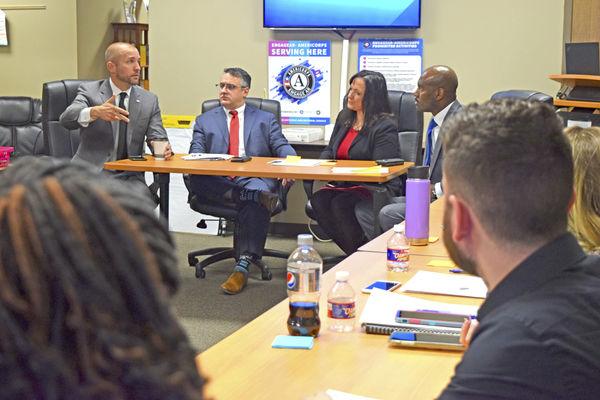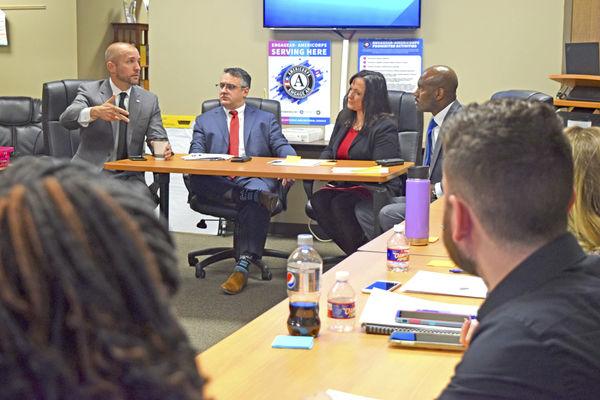Panel discusses juvenile justice reform needs


Editor’s note: The Log Cabin Democrat is taking a deeper look at Faulkner County’s juvenile court system, its successes with the risk assessment tool now mandated across the state through Act 152 and other related juvenile justice reform topics. This is the 13th story in the series.
Local juvenile justice advocates agree there is a dire need for a drug treatment facility that focuses on youth addictions.
Twentieth Judicial District juvenile probation officers, along with disability services representatives and other juvenile justice advocate gathered Thursday for the final training session in the Annie E. Casey Re-Imagining Juvenile Justice workshop series and discussed what needs the juvenile justice system has.
A panel featuring Circuit Judge Troy Braswell Jr., Rep. Spencer Hawks, Senior Advisor for Child Welfare Phyllis Bell and Rep. Fredrick Love spoke about improving the services provided within the juvenile justice system.
During the questionnaire portion of the workshop, Denise Pearson, a Faulkner County probation officer, said services such as drug rehabilitation should be a statewide service for court-involved youth.
Specifically referencing a recent case where a boy received treatment while serving time in the Division of Youth Services, the probation officer said it was unjust that the teen didn’t have access to drug treatment before being sent to DYS.
“There was nothing in this county we cold offer this kid and he had a chronic drug (problem),” Pearson said.
While at DYS, the teen also received do-no-harm education.
“Why can’t every kid get that before they go to DYS,” she asked the panel.
While there are outpatient services available within the 20th Judicial District, Braswell agreed and said that some court-involved youth need more aggressive treatment. However, he said, “the state of Arkansas significantly lacks substance abuse treatment for youth.”
“When I have girls that are becoming dangerous with their drug addictions – I’m not talking about smoking weed on the weekends, I’m talking about methamphetamine – I get to a place where I have to detain for a longer period of time because I know that’s the only way I can guarantee they’re going to be sober and safe,” Braswell said. “It’s a shame that we don’t have (a better) option in the state of Arkansas.”
Love said this discussion brought light to an issue he did not realize existed.
As the juvenile justice advocates and panel participants discussed the need to youth-based drug rehabilitation services across the state, Administrative Office of the Court s Juvenile Justice Specialist Faye Shepherd pointed out that this factor is important to address early on when rehabilitating court-involved youth.
“From what we know from the (risk) assessments and what research has continually shown is that all risk factors are not equal,” she said. “There are some that we have to tackle first. If we don’t get those tackled first, then the child cannot take advantage of other services. Drug and alcohol treatment is a the top of that. If we cannot address that, we can’t address negative peer (issues) or we can’t address parenting issues or we can’t address other things.
Partnerships with organizations such as Deliver Hope help combat treatment-related issues and the district’s juvenile drug court program also works to provide youth counseling services, Braswell said. However, in some cases, there is a greater need for more aggressive treatment.
Because other important services are not available statewide, Shepherd said that “justice by geography” becomes another issue.
Another hurdle juvenile justice advocates face is funding.
Braswell said to inspire qualified, and sometimes bilingual, candidates to the table, judicial districts will ultimately need to up the pay juvenile probation officers earn.
“One of the biggest issues that juvenile justice reform faces throughout the state is lack of financial support,” the juvenile judge said. “One of the biggest areas of concern where there is a lack of financial support is how probation officers are supported and funded. If you look at the areas with the highest commitment rates to DYS, you will also find some of the state’s poorest areas. You will find that the funding for juvenile officers is minimal at best.”
With districts who see success in the risk assessment programs as Faulkner County and the 20th Judicial District has seen, Braswell said there is an “interesting problem” that accompanies that triumph.
As fewer numbers of children enter into the court system, the 20th Judicial District has also seen a “drastic reduction of kids going to jail” as it provides individualized probation terms and programs.
“Our fines, fees and costs are way down because we’ve got 30% fewer kids coming into court,” Braswell said. “People who were on probation for 12 months now are on probation for six months.”
Because there is less money entering the court system this way, the Faulkner County Quorum Court moved to allow the judicial district to pay probation officers from a separate account as opposed to the monies from fee collections.
“These families are paying fines, fees and court costs, (but) we can’t fund juvenile courts on the backs of the families and the kids,” Braswell said, adding that the money collected through said fees goes toward implementing services instead of paying probation salaries.
As the panel discussion wrapped up, local juvenile probation officers listed off the top needs they wanted to see take life with juvenile justice reform movements.
The group said it greatly hoped for a drug and alcohol treatment for court-involved youth along with a residential discipline program geared toward rehabilitating at-risk girls.
Pearson said she would like to see an end to bringing juvenile offenders into the courtroom while still in handcuffs.
“If anything is going to change, it’s going to start right here,” Shepherd said as she encourage the group to work toward juvenile justice reform.
Staff writer Marisa Hicks can be reached at mhicks@thecabin.net.


 Pathways Drug Rehabilitation Luxury Addiction Treatment & Detox Center
Pathways Drug Rehabilitation Luxury Addiction Treatment & Detox Center


